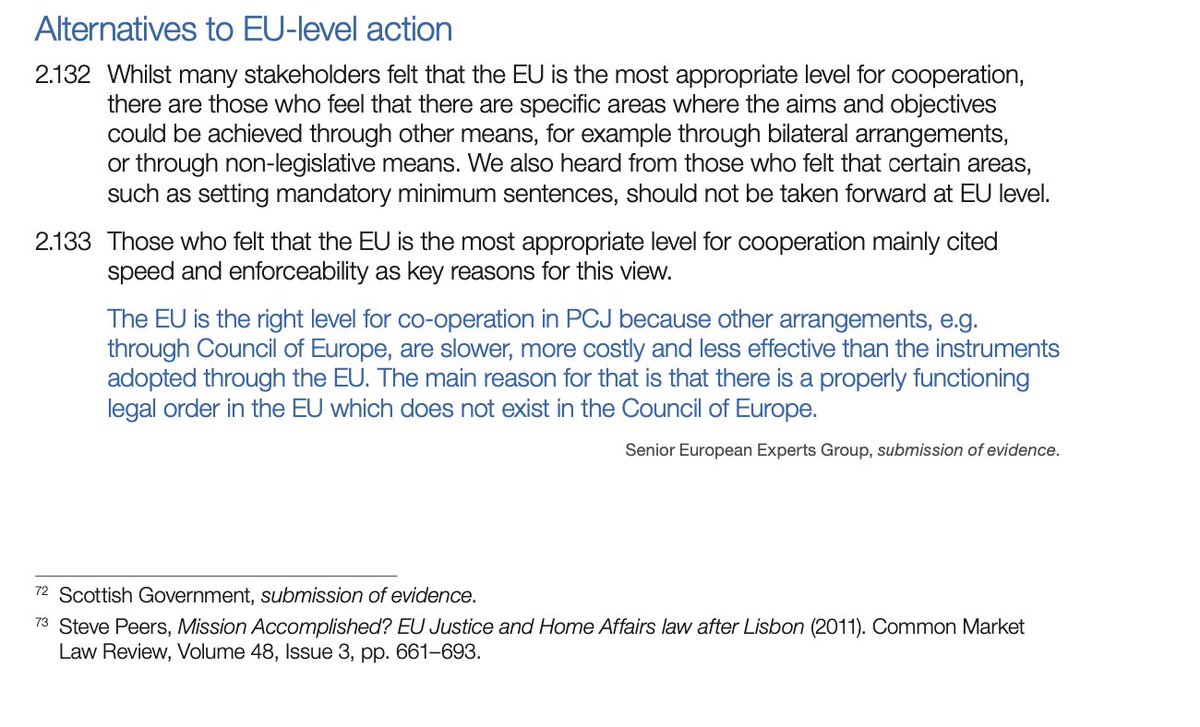Amongst the noise about what the UK govt now says are great opportunities in an & #39;Australian-style deal& #39; (i.e. no deal), bear in mind that the gov& #39;t in 2012 already looked at what the costs and benefits of being in the EU were. Anyone remember the Balance of Competences review? /1
The BoC ran 2012-14 and looked at 32 areas of EU activity, inviting evidence from politicians, thinktanks, businesses, academics, NGOs, EU institutions etc on how close EU/UK interests are, and the relative costs and benefits of EU membership. /2 https://www.gov.uk/guidance/review-of-the-balance-of-competences">https://www.gov.uk/guidance/...
It did not consider impact of leaving the EU (not on the cards at the time) but was supposed to answer the question of whether EU membership was worth it. All reports concluded that on balance, the UK gets more than enough out of membership to offset the costs. /3
Of course, it did not settle the debate in the Conservative party, which is how we ended up here. But it is worth looking at what some of the reports say, why the benefits of membership were an uncomfortable truth and what the UK stands to lose - from the UK& #39;s own perspective. /4
On the single market: integration "appreciable economic benefits. It has also spread the UK’s liberal model of policy-making more widely across the EU" (para 3.44) /5 https://assets.publishing.service.gov.uk/government/uploads/system/uploads/attachment_data/file/227069/2901084_SingleMarket_acc.pdf">https://assets.publishing.service.gov.uk/governmen...
Plus, on global trade: "The EU has been outward-looking in the WTO and through an ambitious programme of FTA negotiations.. Europeans have a liberal regime for inward and outward investment. The EU’s record of openness
to the emerging markets is good." (as above, para 4.6) /6
to the emerging markets is good." (as above, para 4.6) /6
Conclusion? Future direction of single market uncertain in global context but "the Single Market could once again be more at the centre of European political debate, which could open up opportunities for Britain". (para 4.28) /7
The emphasis in the free movement of goods was on the benefit of more integration, not less: (page 6) /8
On health: "the current balance of competence between the EU and the UK was considered by stakeholders to be broadly appropriate" and "EU activity in areas relating to the single market and public health is recognised to add value in the health sector" /8 https://assets.publishing.service.gov.uk/government/uploads/system/uploads/attachment_data/file/224715/2901083_EU-Health_acc.pdf">https://assets.publishing.service.gov.uk/governmen...
On asylum, "The EU as a whole is facing the same border security challenges as the UK, albeit on a larger scale" and "practical cooperation on asylum issues between Member States has been a success" (page 6) /9 https://assets.publishing.service.gov.uk/government/uploads/system/uploads/attachment_data/file/279096/BoC_AsylumImmigration.pdf">https://assets.publishing.service.gov.uk/governmen...
Security: After the Gove answer to May in Parliament yesterday, citing better mechanisms to cooperate with the EU (without naming them), this section is worth a read. In short, the alternatives are not much good. ( @StevePeers gets a mention too!) /10 https://assets.publishing.service.gov.uk/government/uploads/system/uploads/attachment_data/file/388645/PCJBoCreport.pdf">https://assets.publishing.service.gov.uk/governmen...
Enlargement: "the UK has historically been highly influential in driving the enlargement process and has enjoyed significant influence among new and aspirant Member States as a result." (para 6) /11 https://assets.publishing.service.gov.uk/government/uploads/system/uploads/attachment_data/file/388422/BoC_EUEnlargement_acc.pdf">https://assets.publishing.service.gov.uk/governmen...
The other reports make much the same points: there are costs and constraints of EU membership, but on balance the UK is better off. Brexit is not reversible, but these points remain valid when considering the importance of jettisoning the EU relationship in the future. /12
A & #39;no deal& #39; or & #39;slim deal& #39; will have immediate impact, but the loss of global influence via the EU will have much more long term impact. There remains enough evidence in the BoC about *not* being in the EU to understand what the lack of planning for what Brexit might mean. /13
And as many others have pointed out, not least @davidallengreen, the lack of planning before, during and after Art 50 means that we are still on a journey where we should know more about the actual destination than we do. Especially when the evidence was there. /END

 Read on Twitter
Read on Twitter




